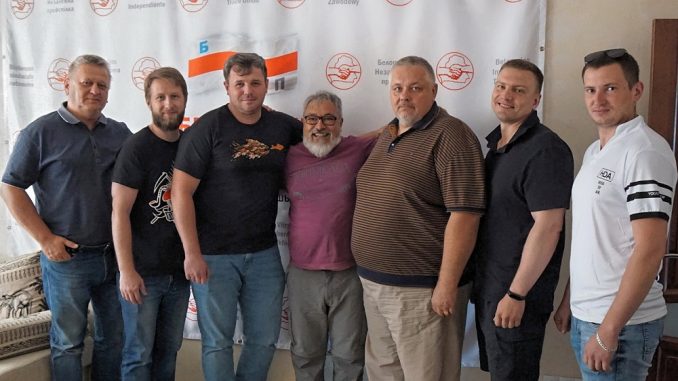
We met with comrades of the Belarusian Independent Union (BNP)
Soligorsk is in the south of the province of Minsk, where there are big mines of potassium salt for export. Its subterranean galleries are also used for healing purposes (caving therapy).
The headquarters of the BNP, composed of miners, chemists, oil and energy, transportation, construction and other workers, are located in this city. We travelled here to chat with comrades we already knew and with new leaders. They welcomed us, we drank tea and talked for hours.
The changes in labor relations are their main concern. In July, the House of Representatives of the National Assembly amended the Labor Code. In legal terms, they “incorporated the dispositions of Decree no. 29, on the transfer of employees to fixed-term employment contracts and Decree no. 5, on excessive punishment of employees and the extension of the grounds for dismissal”.
It is a “no improvement update” to which Maxim Poznyakov, president of the BNP, had already referred to: “Belarus has become a country of temporary employment. The system of short-term universal labor contracts, which is now enshrined in the Labor Code, does not provide people with guarantees of permanent and stable work, which leads young workers to emigrate in search of a better life. On the other hand, a person can become a hostage to a 5-year contract and will be forced to continue until the end if the employer is against the termination of the employment contract by the agreement of the two parts, even if the employee wants to resign! So what kind of flexible and effective employment are we talking about?
With the modifications promoted by the government, the employer can also fire more easily and apply more severe disciplinary penalties. It is not an unknown scenario; the “modernization” of work relationships applied in Europe and Latin America has always been unfavourable for workers.
Another important issue for the union are the measures to avoid bureaucratization, as the limitation of the wages of the leaders, even below what they would earn in their job.
The comrades know that there is no political alternative of the workers. It is a pending task after 25 years of a government with dictatorial characteristics, whose history they related synthetically.
Aleksander Lukashenko, a former Stalinist military man who became independent, assumed the presidency in 1994. In 1995 there was the struggle of the subway workers for a wage increase that was defeated. After the change in the correlation of force, the government counteroffensive advanced union by union.
In 2002, Lukashenko appointed the leaders of the Federation and introduced the figure of the “ideological guardian” to impose his policies through fear and/or patronage. Then the organization stopped promoting mobilization and struggle.
It is in this difficult situation in which the comrades that do not give up nor sell out, and in which they will face great challenges in the upcoming months. Finally, we said goodbye and exchanged presents: vodka, stickers, a union flag, books of posters and graffiti from the French May. We drove the 134 km that separates Soligorsk from Minsk among fields and forests; happy to assimilate their experiences, with the will to spread their struggle and support their fair demands.
Though three decades have passed since the fall of Stalinism and the introduction of capitalism, democratic and social needs remain unsatisfied. In the International Socialist League, we are convinced that the solutions will not come with the imperialist aspirations of the European Union, Russia, China or the United States, nor with the exploitative and looting investments of capitalism. Much less with oppressive and corrupt Stalinist bureaucrats, whether they be nostalgic or recycled.
We must build trade unions and political organizations throughout the world with new leaders who fight for immediate workers´ conquests with a strategy: that workers and the people rule in socialism with workers’ democracy and total liberties.
Rubén Tzanoff y Anatoly Matvienko.








